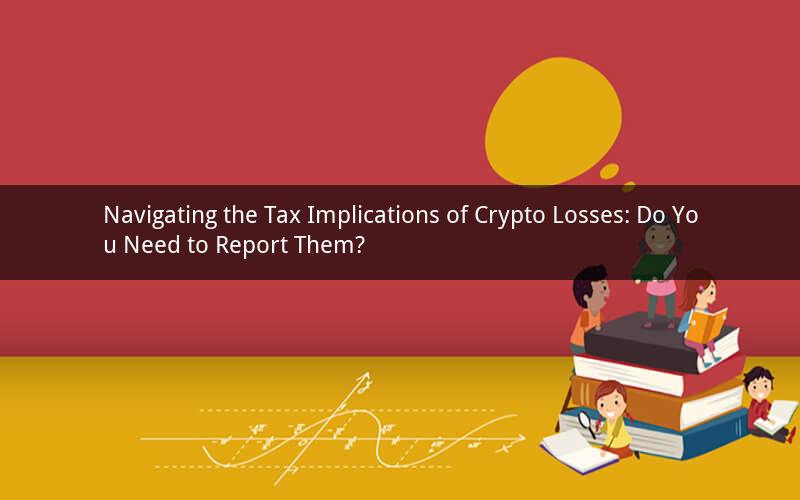
Introduction:
Cryptocurrency has gained immense popularity in recent years, and with it, questions about tax obligations have arisen. One common query is whether individuals need to report crypto losses on their taxes. In this article, we will delve into the intricacies of reporting crypto losses and provide insights into the tax implications involved.
1. Understanding Crypto Losses:
Crypto losses occur when the value of cryptocurrencies you own decreases, resulting in a financial loss. These losses can arise from various situations, such as selling cryptocurrencies at a lower price than their purchase price or disposing of them in a way that results in a loss.
2. Reporting Crypto Losses:
Whether or not you need to report crypto losses on your taxes depends on the nature of the loss and the specific tax jurisdiction you reside in. Here are some key considerations:
a. Taxable Events:
In most cases, crypto losses are considered taxable events. This means that if you incur a loss from selling or disposing of cryptocurrencies, you may be required to report it on your tax return.
b. Capital Gains Tax:
When it comes to crypto losses, they are typically categorized as capital losses. Capital gains tax is applicable to the gains realized from the sale of capital assets, including cryptocurrencies. However, the treatment of crypto losses may vary depending on your tax jurisdiction.
c. Deduction Limitations:
While you may be able to deduct crypto losses on your taxes, there are limitations. In many countries, including the United States, you can deduct up to $3,000 ($1,500 if married filing separately) of capital losses annually against ordinary income. Any losses exceeding this limit can be carried forward to future years.
3. Reporting Crypto Losses in Different Jurisdictions:
a. United States:
In the United States, crypto losses are reported on Schedule D of Form 1040. You will need to provide details about the cryptocurrency sold, the date of acquisition, the cost basis, and the amount of loss. It is important to keep accurate records of all cryptocurrency transactions to ensure proper reporting.
b. United Kingdom:
In the United Kingdom, crypto losses are treated similarly to other capital losses. They can be offset against capital gains or carried forward to future years. To report crypto losses, you will need to complete the Self Assessment tax return and provide details of the cryptocurrency transactions.
c. Canada:
In Canada, crypto losses are treated as capital losses and can be deducted against capital gains. To report crypto losses, you will need to complete Schedule 3 of your tax return and provide information about the cryptocurrency transactions.
4. Keeping Accurate Records:
Accurate record-keeping is crucial when it comes to reporting crypto losses on taxes. Here are some key records to maintain:
a. Transaction History:
Keep a detailed record of all cryptocurrency transactions, including purchases, sales, and exchanges. This will help you determine the cost basis for each cryptocurrency held.
b. Verification of Transactions:
Ensure that you have proper documentation to verify the transactions, such as receipts, invoices, or transaction histories from cryptocurrency exchanges.
c. Valuation of Cryptocurrencies:
Keep track of the valuation of cryptocurrencies at the time of acquisition and disposal. This will help you determine the amount of loss incurred.
5. Seeking Professional Advice:
Navigating the tax implications of crypto losses can be complex, especially with the ever-evolving nature of cryptocurrency regulations. It is advisable to seek professional tax advice to ensure compliance with the specific tax laws and regulations applicable to your jurisdiction.
Conclusion:
Reporting crypto losses on taxes is an important aspect of cryptocurrency ownership. Understanding the tax implications and keeping accurate records are crucial steps in ensuring compliance with tax regulations. Whether you need to report crypto losses depends on the nature of the loss and the specific tax jurisdiction you reside in. Seeking professional tax advice can provide further clarity and guidance in navigating the complexities of crypto tax obligations.
Questions and Answers:
1. Q: Can I deduct crypto losses on my taxes if I incurred them in a foreign country?
A: It depends on your tax jurisdiction. In some cases, you may be able to deduct crypto losses incurred in foreign countries, but it is essential to consult with a tax professional to understand the specific rules and regulations applicable to your situation.
2. Q: Can I deduct crypto losses from my business income?
A: Generally, crypto losses incurred in a business context are treated differently than personal crypto losses. Business-related crypto losses are typically deductible against business income, but the specific rules may vary depending on your tax jurisdiction.
3. Q: What if I lost my cryptocurrency due to a security breach or theft?
A: If you lost your cryptocurrency due to a security breach or theft, it may still be considered a taxable event. However, you may be able to deduct the loss as a capital loss on your tax return. It is advisable to consult with a tax professional to determine the appropriate treatment of such losses.
4. Q: Can I deduct crypto losses from my rental income?
A: Crypto losses incurred from rental properties can be deductible against rental income. However, the specific rules and limitations may vary depending on your tax jurisdiction. Seeking professional tax advice is recommended to ensure proper reporting.
5. Q: Are there any tax implications if I donate cryptocurrencies?
A: Donating cryptocurrencies can have tax implications. The value of the donated cryptocurrency is typically considered a charitable contribution, which may be deductible on your tax return. However, the specific rules and limitations may vary depending on your tax jurisdiction. Consulting with a tax professional is advisable to understand the tax implications of cryptocurrency donations.